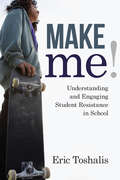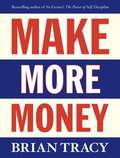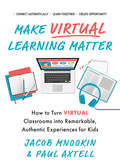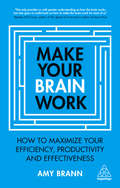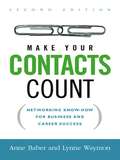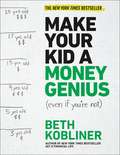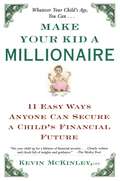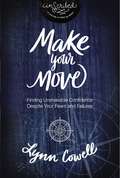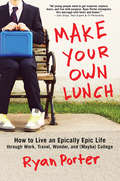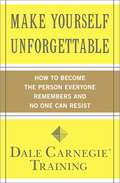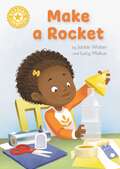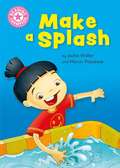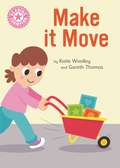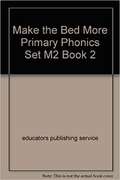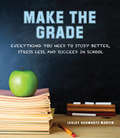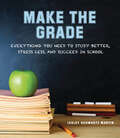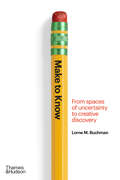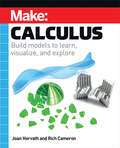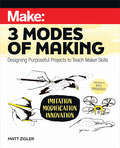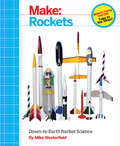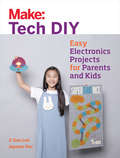- Table View
- List View
Make Me!: Understanding and Engaging Student Resistance in School (Youth Development and Education Series)
by Eric ToshalisIn this groundbreaking book, Eric Toshalis explores student resistance through a variety of perspectives, arguing that oppositional behaviors can be not only instructive but productive. All too often treated as a matter of compliance, student resistance can also be understood as a form of engagement, as young people confront and negotiate new identities in the classroom environment. The focus of teachers&’ efforts, Toshalis says, should not be about &“managing&” adolescents but about learning how to read their behavior and respond to it in developmentally productive, culturally responsive, and democratically enriching ways. Noting that the research literature is scattered across fields, Toshalis draws on four domains of inquiry: theoretical, psychological, political, and pedagogical. The result is a resource that can help teachers address this pervasive classroom challenge in ways that enhance student agency, motivation, engagement, and academic achievement. The coauthor ofUnderstanding Youth: Adolescent Development for Educators (Harvard Education Press, 2006), Toshalis blends accessible explanations of theory and research with vignettes of interactions among educators and students. In Make Me!, Toshalis helps teachers perceive possibility, rather than pathology, in student resistance.
Make Meetings Work: Teach Yourself
by Karen ManneringMeetings are an inevitable and often unwelcome aspect of the working day. They figure heavily in all walks of life and create a forum for providing information, holding discussions, and making decisions. If they are run well they are a really valuable tool in running your organisation and progressing projects. If run badly they can seem like no more than a time-wasting irritant to the participants.Whether you hold meetings in your office or attend international summits, the meeting is a place where certain etiquette is essential. How to run a meeting, behave in a meeting, construct minutes, and Chair meetings are all essential skills for anyone wishing to move projects forward, forge a career in business or even run their own business. So, even if you are only a participant in frequent meetings this book will show you how to get the most out of them and ensure that they are a building block of success. From issuing invitations to taking the minutes, or even chairing a meeting, everything is covered.
Make Meetings Work: Teach Yourself
by Karen ManneringMeetings are an inevitable and often unwelcome aspect of the working day. They figure heavily in all walks of life and create a forum for providing information, holding discussions, and making decisions. If they are run well they are a really valuable tool in running your organisation and progressing projects. If run badly they can seem like no more than a time-wasting irritant to the participants.Whether you hold meetings in your office or attend international summits, the meeting is a place where certain etiquette is essential. How to run a meeting, behave in a meeting, construct minutes, and Chair meetings are all essential skills for anyone wishing to move projects forward, forge a career in business or even run their own business. So, even if you are only a participant in frequent meetings this book will show you how to get the most out of them and ensure that they are a building block of success. From issuing invitations to taking the minutes, or even chairing a meeting, everything is covered.
Make More Money
by Brian TracyFrom the bestselling expert on personal and professional success, Make More Money reveals Brian Tracy's deep understanding of the self-made millionaires of our world and how to become one.In this eboook he shares his know-how so you too can learn how to achieve more than you ever dreamed possible. Make More Money uses examples and provides hints and habits for listeners who want to succeed.An Eye Opener--Who Becomes Wealthy?Habits of Millionaires and BillionairesHow to Develop New HabitsHow Rich People ThinkMore Ways Rich People Think -- Earning More MoneyThe 7 Basics of Business SuccessThe 7 Habits of High Profit BusinessesThe 7 Habits for Personal Success
Make Virtual Learning Matter: How to Turn Virtual Classrooms into a Remarkable, Authentic Experience for Kids (Ignite Reads)
by Paul Axtell Jacob MnookinFrom education expert Jacob Mnookin and virtual meeting expert Paul Axtell, comes a tool to ensure virtual learning at its finest. Together with our children and their teachers, we can help ensure that our kids are back on track, learning as they would be in a school building.
Make Your Brain Work: How to Maximize Your Efficiency, Productivity and Effectiveness (Kogan Page Ser.)
by Amy BrannDo you know how your brain functions? Do you sometimes feel like you're fighting your own brain and habits in order to be productive at work? What if there was a way to work with your brain to become more efficient, effective and productive... and transform the way you operate? Make Your Brain Work is here to help. Author Amy Brann is fascinated by the application of brain science to business, and you don't have to be an expert to understand - she explains the principles and latest insights in practical and easy-to-understand language, enabling you to understand the way you work, and form the helpful habits that will revolutionize your output. With clear, in-context examples; hands-on tips; and focused case studies on how companies are doing things well and the pitfalls to avoid, this entertaining book will help you reduce the stress and overwhelm of poor time management, and help get you to that next professional level. Including brand-new content on developing resilience and creativity, and managing your work-life balance, now it's even easier to Make Your Brain Work!
Make Your Contacts Count: Networking Know-How for Business and Career Success
by Anne Baber Lynne WaymonThis book is a practical, step-by-step guide for creating, cultivating, and capitalizing on networking relationships and opportunities.Updated from its first edition, Make Your Contacts Count now includes expanded advice on building social capital at work and in job hunting, as well as new case studies, examples, checklists, and questionnaires.You will discover how to:draft a networking plancultivate current contactsmake the most of membershipseffectively exchange business cardsavoid the top ten networking turn-offsshare anecdotes that convey character and competencetransform your career with a networking makeoverJob-seekers, career-changers, entrepreneurs, and others will find all the networking help they need to supercharge their careers and boost their bottom lines. Packed with valuable tools, Make Your Contacts Count offers a field-tested "Hello to Goodbye" system that takes you from entering a room, to making conversations flow, to following up.
Make Your Kid A Money Genius (Even If You're Not): A Parents' Guide for Kids 3 to 23
by Beth KoblinerThe New York Times bestseller that is a must-read for any parent! From Beth Kobliner, the author of the bestselling personal finance bible Get a Financial Life—a new, must-have guide showing parents how to teach their children (from toddlers to young adults) to manage money in a smart way.Many of us think we can have the “money talk” when our kids are old enough to get it…which won’t be for years, right? But get this: Research shows that even preschoolers can understand basic money concepts, and a study from Cambridge University confirmed that basic money habits are formed by the age of seven. Oh, and research shows the number one influence on kids’ financial behaviors is mom and dad. Clearly, we can’t afford to wait. Make Your Kid a Money Genius (Even If You’re Not) is a jargon-free, step-by-step guide to help parents of all income levels teach their kids—from ages three to twenty-three—about money. It turns out the key to raising a money genius isn’t to teach that four quarters equal a dollar or how to pick a stock. Instead, it’s about instilling values that have been proven to make people successful—not just financially, but in life: delaying gratification, working hard, living within your means, getting a good education, and acting generously toward others. More specifically, you’ll learn why allowance isn’t the Holy Grail when teaching your kid to handle money, and why after-school jobs aren’t always the answer either. You’ll discover the right age to give your kid a credit card, and learn why doling out a wad of cash can actually be a good parenting move. You don’t need to be a money genius to make your kid a money genius. Regardless of your comfort level with finance—or your family’s income—this charming and fun book is an essential guide for passing along enduring financial principles, making your kids wise beyond their years—and peers—when it comes to money.
Make Your Kid a Millionaire
by Kevin MckinleyA STEP-BY-STEP PROGRAM THAT SHOWS PARENTS WHAT TO DO AT EACH STAGE OF A CHILD'S LIFE TO PROVIDE WEALTH FOR THE NEXT GENERATION. If you're like most parents, you know that you should start saving for your children's future but you're just not sure where to begin. In Make Your Kid a Millionaire, Kevin McKinley presents eleven easy ways parents can give their children a college education, a home, a comfortable retirement, and a chance to reach their goals without looking to you for money. With a commonsense approach, McKinley takes the reader from the birth of a child into adulthood and Guides parents through market swings Shows parents and grandparents how to cut their tax bills as they grow their family net worth Recommends "catch-up" tips to parents who haven't started saving yet Shows you where to find money to save Whether you earn six dollars an hour or six figures a year, Make Your Kid a Millionaire helps your kids acquire everything that more money can provide: Time. Knowledge. Security. Stability. And it will grant you the peace of mind that comes with supplying your children with a financial head start.
Make Your Move: Finding Unshakable Confidence Despite Your Fears and Failures (InScribed Collection)
by Lynn CowellIn this six-session Bible study (DVD/digital video sold separately), author and Proverbs 31 Ministries speaker Lynn Cowell explores how confidence-in-question keeps us from boldly experiencing what God intends for our lives. Dive into six stories in the Bible of not-so-well-known women who found themselves needing confidence to make their move, and how they uncovered the faith to get it. Lynn encourages women to leave behind all the unnecessary insecurity this world induces and find confidence in God alone.Learn from the Daughters of Zelophehad, the Women of Exodus, Martha & Mary, Rahab, Deborah, Abigail and Michal how to:Intentionally build your confidence on the one thing that cannot be taken from you.Recover from defeating decisions to move forward toward a strong self-worth.Position yourself to not lose your poise—even in the worst circumstances.Identify and address the fears that keep you stuck, with practical steps to walk in your calling with confidence.This study is for any woman who’s ready to dig into God’s Word to find confidence and boldness to do great things. This book includes personal Bible study as well as group discussion questions. The study can be completed by individuals as well as in groups.Designed for use with the companion Make Your Move Video Study (sold separately).
Make Your Own Lunch
by Ryan PorterHelping young people find their path to a successful future-with or without college College isn't right for everyone. And as tuition costs continue to rise, more and more young people-from straight-A students to the not-so-avid pupils-are choosing an alternative to the 4-year degree. Yet there is little support to help them find their track to a promising future beyond the classroom. Make Your Own Lunch empowers and guides young people as they search for their answer to the age-old question: "What do you want to be when you grow up?" Readers discover new ways to pursue their interests and gain experience through travel, philanthropy, and more.
Make Yourself Unforgettable: How to Become the Person Everyone Remembers and No One Can Resist (Dale Carnegie Books)
by Dale Carnegie TrainingFrom one of the most trusted and bestselling brands in business training, Make Yourself Unforgettable reveals how to develop and embody unforgettable qualities so you can become the effective and desirable colleague and friend possible.Learn how to develop and embody the ten essential elements of being unforgettable! What does it really mean to have class? How do you distinguish yourself from the crowd and become a successful leader? When should intuition guide your business decisions? The answers to these and other important questions can be found in this dynamic and inspiring guidebook for anyone looking to lead a life of greater meaning and influence. In Make Yourself Unforgettable you can learn the secrets to making a positive, lasting impression, including: · The six steps to managing communication problems · The four unexpected stumbling blocks to ethical behavior and how to avoid them · A new way to understand and exude confidence · Techniques for building resiliency and preventing fear · The five key social skills that identify someone as a class act Once you discover how you can naturally and effortlessly distinguish yourself, you’ll quickly find people in all areas of life responding to you more positively and generously than ever before.
Make a Cake: Independent Reading Green 5 Non-fiction (Reading Champion #1138)
by Katie WoolleyThis story is part of Reading Champion, a series carefully linked to book bands to encourage independent reading skills, developed with Dr Sue Bodman and Glen Franklin of UCL Institute of Education (IOE)Reading Champion offers independent reading books for children to practise and reinforce their developing reading skills.Fantastic, original stories are accompanied by engaging artwork and a reading activity. Each book has been carefully graded so that it can be matched to a child's reading ability, encouraging reading for pleasure.
Make a Rocket: Independent Reading Yellow 3 (Reading Champion #515)
by Jackie WalterA non-fiction reader about following intructions to make a rocket from household objects. This text is part of Reading Champion, a series carefully linked to book bands to encourage independent reading skills, developed with Dr Sue Bodman and Glen Franklin of UCL Institute of Education (IOE)Reading Champion offers independent reading books for children to practise and reinforce their developing reading skills.Fantastic, original stories are accompanied by engaging artwork and a reading activity. Each book has been carefully graded so that it can be matched to a child's reading ability, encouraging reading for pleasure.
Make a Splash: Independent Reading Non-Fiction Pink 1a (Reading Champion #515)
by Jackie WalterThis book is part of Reading Champion, a series carefully linked to book bands to encourage independent reading skills, developed with UCL Institute of Education (IOE)Make a Splash is a non-fiction text exploring how different people can make a splash in water. The repeated sentence structure offers readers the opportunity for a very first independent reading experience with the support of the illustrations.Reading Champion offers independent reading books for children to practise and reinforce their developing reading skills.This early non-fiction text is accompanied by engaging artwork and a reading activity. Each book has been carefully graded so that it can be matched to a child's reading ability, encouraging reading for pleasure.
Make a Wish
by Judith KayIt was love at first sight when aspiring actors Abby Nicholson and Lucas Miller met at an audition in NewYork City. After just a few months, their romance seemed destined for marriage. But will their love survive when the demands of their careers and families get in the way? Genre: Romance Length: about 15,000 words Level: 4th grade
Make it Move: Independent Reading Pink 1B Non-fiction (Reading Champion #515)
by Katie WoolleyMake it Move is an informaiton book about pushing and pulling objects for children starting to learn to read. This book is part of Reading Champion, a series carefully linked to book bands to encourage independent reading skills, developed with Dr Sue Bodman and Glen Franklin of UCL Institute of Education (IOE)Reading Champion offers independent reading books for children to practise and reinforce their developing reading skills.Fantastic, original texts are accompanied by engaging artwork and a reading activity. Each book has been carefully graded so that it can be matched to a child's reading ability, encouraging reading for pleasure.
Make the Grade: Everything You Need to Study Better, Stress Less, and Succeed in School
by Lesley Schwartz MartinEvery teacher, every school, and every class is unique, but there are certain things that successful students have in common no matter where they are. Everyone needs to prioritize well, stay organized, and know how to study for different topics, but actually managing to achieve those goals isn’t easy or straightforward. Make the Grade dissects the school week as students actually experience it-and offers realistic solutions to common problems, from difficult teachers and over-booked schedules to boring homework and the endless variety of (more enjoyable) distractions. Inside you’ll also find: Sidebars that offer timesaving techniques, confidence-boosting exercises, and creative ways to add new studying skills Checklists to help ensure you do everything you can to set yourself up for success Charts and maps that provide clear, concise guidance in navigating difficult subjects and planning for future obstacles
Make the Grade: Everything You Need to Study Better, Stress Less, and Succeed in School
by Lesley Schwartz MartinEvery teacher, school, and class is unique, but there are certain things that successful students have in common no matter what. Make the Grade helps students everywhere stay on top of schoolwork by dissecting the school week as students actually experience it, and offering realistic solutions to common problems, from difficult teachers and over-booked schedules to boring homework and the endless variety of distractions. This book also includes sections on memory tricks, reading tips, note-taking, organization, and test preparation.
Make to Know: From Spaces of Uncertainty to Creative Discovery
by Lorne M. BuchmanA journey through the minds of some of the most creative people on the planet reveals that creativity is rarely a “lightbulb moment” and instead arrives through a process of making and self-understanding. The creative process is winding. It involves entertaining uncertainty and improvising new paths to knowing. In this insightful and informed book, Lorne M. Buchman, an international leader in art and design education and president of ArtCenter College of Design in Pasadena, California, guides readers through stories of a diverse and talented group of artists, entrepreneurs, innovators, and designers. Including such luminaries as Yves Béhar, Chris Kraus, Zack Snyder, Paula Scher, and Frank Gehry and businesses like Apple and Tesla who have changed the world as we know it, Buchman focuses on the revelatory nature of the creative journey itself. Michelangelo is said to have seen the angel in the stone and carved away until he set him free. Make to Know is about making as a path to knowing—presenting creativity as a “carving away” toward a revelation, not as a fully formed epiphany gleaned from a mysterious ether. As Buchman reveals throughout this provocative book, uncertainty is the space where discovery happens and where creators can be both playful and imaginative. Whether you’re an artist, designer, writer, daydreamer, or doodler, anyone can learn from these lessons on the varied paths to self-expression.
Make: Calculus
by Joan Horvath Rich CameronWhen Isaac Newton developed calculus in the 1600s, he was trying to tie together math and physics in an intuitive, geometrical way. But over time math and physics teaching became heavily weighted toward algebra, and less toward geometrical problem solving. However, many practicing mathematicians and physicists will get their intuition geometrically first and do the algebra later.Make:Calculus imagines how Newton might have used 3D printed models, construction toys, programming, craft materials, and an Arduino or two to teach calculus concepts in an intuitive way. The book uses as little reliance on algebra as possible while still retaining enough to allow comparison with a traditional curriculum.This book is not a traditional Calculus I textbook. Rather, it will take the reader on a tour of key concepts in calculus that lend themselves to hands-on projects. This book also defines terms and common symbols for them so that self-learners can learn more on their own.
Make: Designing Purposeful Projects to Teach Maker Skills
by Matt ZiglerThe Maker movement has been an excellent opportunity for people to become producers rather than just consumers, and schools are recognizing the value of offering students the tools, materials, and skills necessary to design sophisticated and meaningful projects. But teaching technical skills should not be the end goal: At its best, a Maker education teaches students to think and act in creative ways that can be applied to difficult challenges in all areas of life.Three Modes of Making provides a framework for Maker courses in upper grades that teach students creative-process skills through three key Maker modes: Imitation, Modification, and Innovation. Educators will learn the differences between the three Maker modes, their associated skill sets, and gain concrete methods to teach, document, and assess these skills. Through this approach, teachers will enable students to apply them to different creative needs.By focusing on how to teach skill development rather than merely how to build specific objects, Three Modes of Making enables students to improve and enhance their creative skills, and learn ways to apply them to a wide variety of challenges. This book is a road map to developing the creative problem solvers that the world needs for the future.
Make: Down-to-Earth Rocket Science
by Mike WesterfieldThis book teaches the reader to build rockets--powered by compressed air, water, and solid propellant--with the maximum possible fun, safety, and educational experience.Make: Rockets is for all the science geeks who look at the moon and try to figure out where Neil Armstrong walked, watch in awe as rockets lift off, and want to fly their own model rockets. Starting with the basics of rocket propulsion, readers will start out making rockets made from stuff lying around the house, and then move on up to air-, water-, and solid propellant-powered rockets. Most of the rockets in the book can be built from parts in the Estes Designer Special kit.
Make: Easy Electronics Projects for Parents and Kids
by Jaymes Dec Ji Sun LeeKid Crafts introduces younger children to the magic of electronics through the softer side of circuits! Young explorers will learn about electronics through sewing and craft projects aimed at maker parents and their children, elementary school teachers, and kids' activity leaders. Each project introduces new skills and new components in a progressive series of projects that take learners from the very basics to understanding how to use components such as sensors, transistors, and timers. The book is breezy, highly illustrated, and fun for everyone!
